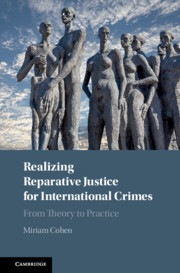Book contents
- Realizing Reparative Justice for International Crimes: From Theory to Practice
- Realizing Reparative Justice for International Crimes
- Copyright page
- Dedication
- Contents
- Foreword
- Acknowledgments
- Table of Cases
- Abbreviations
- Prologue
- Introduction
- 1 Punishment and Reparation
- 2 Reparative Justice at International and Hybrid Criminal Tribunals
- 3 The Construction of a Reparative Dimension of International Justice Before the International Criminal Court (ICC)
- 4 Victims of International Crimes Within Administrative Mechanisms
- 5 The Role of National Courts and Mechanisms in Realizing Reparative Justice for International Crimes
- 6 Conclusions
- Bibliography
- Index
4 - Victims of International Crimes Within Administrative Mechanisms
The Example of the ICC Trust Fund for Victims (TFV)
Published online by Cambridge University Press: 16 June 2020
- Realizing Reparative Justice for International Crimes: From Theory to Practice
- Realizing Reparative Justice for International Crimes
- Copyright page
- Dedication
- Contents
- Foreword
- Acknowledgments
- Table of Cases
- Abbreviations
- Prologue
- Introduction
- 1 Punishment and Reparation
- 2 Reparative Justice at International and Hybrid Criminal Tribunals
- 3 The Construction of a Reparative Dimension of International Justice Before the International Criminal Court (ICC)
- 4 Victims of International Crimes Within Administrative Mechanisms
- 5 The Role of National Courts and Mechanisms in Realizing Reparative Justice for International Crimes
- 6 Conclusions
- Bibliography
- Index
Summary
Chapter 4 examines the role of international administrative mechanisms (linked with a judicial mechanism) in the provision of reparations for international crimes. It questions whether reparations should be dealt with primarily by administrative mechanisms such as trust funds or claims commissions, and examines these questions through the lens of the legal framework and experience of the ICC Trust Fund for Victims (TFV), as the main administrative mechanism dealing with reparations for international crimes. Considering the important questions that the TFV raises regarding reparations and the central role it has played thus far in the ICC context, the book devotes a separate chapter to the TFV to fully engage with the unique dimensions of its mandates, the challenges it faces and whether it can serve as a model for the development of other administrative mechanisms for reparations for international crimes. This chapter carefully analyses the TFV within the ICC structure, its reparations and assistance mandates, the role it has played in the implementation of the first decisions on reparations, and how this role should further develop. It also discusses the practical implications of the activities of the TFV on reparative justice, and its practical challenges, including scarcity of resources.
Keywords
- Type
- Chapter
- Information
- Realizing Reparative Justice for International CrimesFrom Theory to Practice, pp. 126 - 149Publisher: Cambridge University PressPrint publication year: 2020



